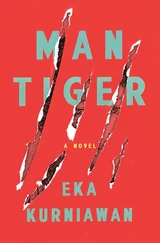“Thanks, but I’d never go to anyone’s house late at night all by myself.”
So as the night grew colder the girl stayed where she was, without any blanket or cushion, sitting directly on the sandy dirt. Feeling that his presence was disturbing her, Kamino finally left, going back into his house and preparing dinner. He reappeared with a portion of food for Farida.
“You’re too kind,” she said.
“Oh, it’s just a side job for gravediggers.”
“I bet not that many people sit by a grave until you give them some dinner.”
“True enough, but many souls of the dead are starving.”
“You socialize with dead people?”
Kamino saw a small crack through which he could slip into the girl’s life. “Yeah. I could even call your father’s spirit if you wanted.” And that was what happened. By playing jailangkung as he’d learned to do from his ancestors, Kamino called back the soul of Mualimin and let that old veteran possess his body. Now he became Mualimin, speaking with Mualimin’s voice, on behalf of Mualimin, who came face-to-face with his daughter, Farida. The girl was overjoyed to hear her father’s voice again, as if it was just like any other night, talking for a while after eating dinner before going into their own rooms to sleep. Now, after finishing the dinner that Kamino had given her, Farida found herself once again chatting with her dad, as if death didn’t exist, until she remembered and said:
“But you are dead, Daddy!”
“Well don’t be too jealous of me,” said her father, “you’ll get your turn someday.”
The conversation tired her out, especially because she’d been there since the early afternoon, and she fell asleep beside the grave. Kamino ended his jailangkung session, and went to get a blanket. He covered the girl, with the attentive gentle movements of a man intoxicated by love, and then stood gazing at her face which appeared, and then was swallowed by the darkness, and then appeared again in the quivering light of the lantern, tossing in the wind. After making sure the girl was safe inside her blanket and that the lantern would last until morning, Kamino went back to his house and tried to sleep, but he thought about the girl all night long, dozing only when the first morning light broke through the frangipani leaves.
At half past ten he woke to the aroma of spices. Not yet fully alert, he stumbled out of bed and walked to the back of the house. His vision was still a little blurry, but he saw a girl carrying a steaming bowl, which she placed on the dining table.
“I cooked for you.”
He immediately recognized Farida. He was amazed.
“Bathe first,” said Farida, “or wash your face. We’ll eat together.”
Like a hypnotized man, he walked only half-conscious to the bathroom, almost forgetting to take his towel, and bathed as quickly as he could. He found the girl sitting at the dining table waiting for him. The rice was still warm. The bowl was filled with cabbage and carrot and macaroni soup. On one plate he saw fried tempeh, and on another plate he saw flying fish that had been chopped up into small pieces and fried nice and crispy.
“I found it all in the kitchen.”
Kamino nodded. It felt miraculous — he hadn’t eaten with another person for years, not since his mother and father were still alive. Now here he was with a young woman, the one he had secretly fallen in love with the previous afternoon. His heart raced uncontrollably, and he still didn’t dare to look at the girl’s face as he ate. They only peeked at each other every once in a while, and if their eyes met they would smile shyly, like two sinners caught in the act. They sat across the dining table from one another, looking exactly like a pair of happy newlyweds.
This love story was slightly disrupted by a busy afternoon. Five people had been killed in a clash between communists and anti-communists. There were four communists and one anti-communist and Kamino had to bury them all. He soon realized that more and more corpses were going to arrive at that cemetery, and that these days would mark the inevitable downfall of the Communist Party. He knew this from the numbers of dead. He dug five new graves, four in one corner for the communists, and one in another corner where the regular folks were buried. Five dead people, each with their kinsmen crying over their graves, and short speeches from the Party leaders, consumed all his time until the afternoon. But while he was busy, Farida didn’t go anywhere. She sat all day beside her father’s grave, just as she had done the day before.
“I am willing to bet,” said Kamino to Farida after his work was done and he was walking back to the house to wash up, “that tomorrow ten more communists will die.”
“If it gets to be too much,” said Farida, “bury them in one mass grave. On the seventh day there might be as many as nine hundred dead communists — there’s no way you can dig that many graves.”
“I just hope their children aren’t as foolish as you,” said Kamino. “Because to feed them I’d have to throw a banquet.”
“Tonight, may I be your guest?”
That question took Kamino off guard, so he could only respond with a nod. Farida prepared their dinner, and after eating they once again called a spirit: none other than Mualimin, of course, and Farida could once again have a nice chat with her dad. This continued until nine o’clock at night, when it was time to go to bed. Farida got the room that used to belong to Kamino’s mother and father, while he slept in the same room he had slept in since he was a child.
The next day, Kamino and Farida’s predictions came true — early in the morning twelve communists died. This time there were no eulogies by Party leaders, because the situation was dire. There was talk that DN Aidit and the leaders of the Communist Party had in fact been executed. The twelve communist corpses were thrown into the cemetery without ceremony. He didn’t know their names. And even though he only dug one big grave for twelve corpses, it was a busy day for Kamino because at noon the military truck reappeared and tossed out eight more corpses. Then in the afternoon he got seven more.
Farida sat at her father’s grave, and when night fell she was Kamino’s guest, while he was still busy with the onslaught of corpses. And that’s how it went until the seventh day.
While most Communist Party sympathizers had gone running, more than one thousand communists still held out against the mob of soldiers and anti-communists at the end of Jalan Meredeka. Some of them shouldered old weapons, with severely limited ammunition. Besieged for one day and one night, they were very hungry but not willing to surrender. The stores in the area had already been destroyed and all the inhabitants had fled. Heavily armed soldiers surrounded them from all directions, and their commander had ordered the communists to disperse, telling them with a shrill voice that the Party had been finished from the moment their coup failed. But one thousand or more communists still held out.
As dusk approached, a few of them took shots at the soldiers. But their bullets wounded no one. The commander finally lost his patience and ordered his men to shoot. Hit from all sides, communists collapsed in the street. Those who had not yet been killed ran about in a blind panic, knocking one another down, before the bullets killed them off one by one. That afternoon, in one quick massacre, one thousand two hundred and thirty-two communists died, bringing an end to the history of the Communist Party in that city, and the entire country.
The corpses were heaved onto trucks, more and more, packed like stacks in a slaughterhouse transport, and a convoy of those corpse-filled trucks headed for Kamino’s house. That day was the man’s busiest day of all. He had to dig an extremely large pit — by the middle of the night he still wasn’t done, only finishing up with the help of some soldiers as dawn broke. He kept hoping that the communists would surrender, so that no more corpses would appear and he could finally rest. Through all this, Farida stayed with him, waiting for him, preparing his food, and sitting beside her father’s grave.
Читать дальше











